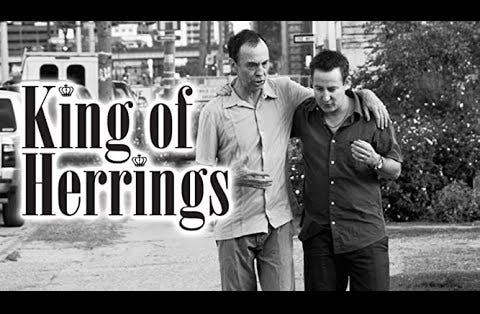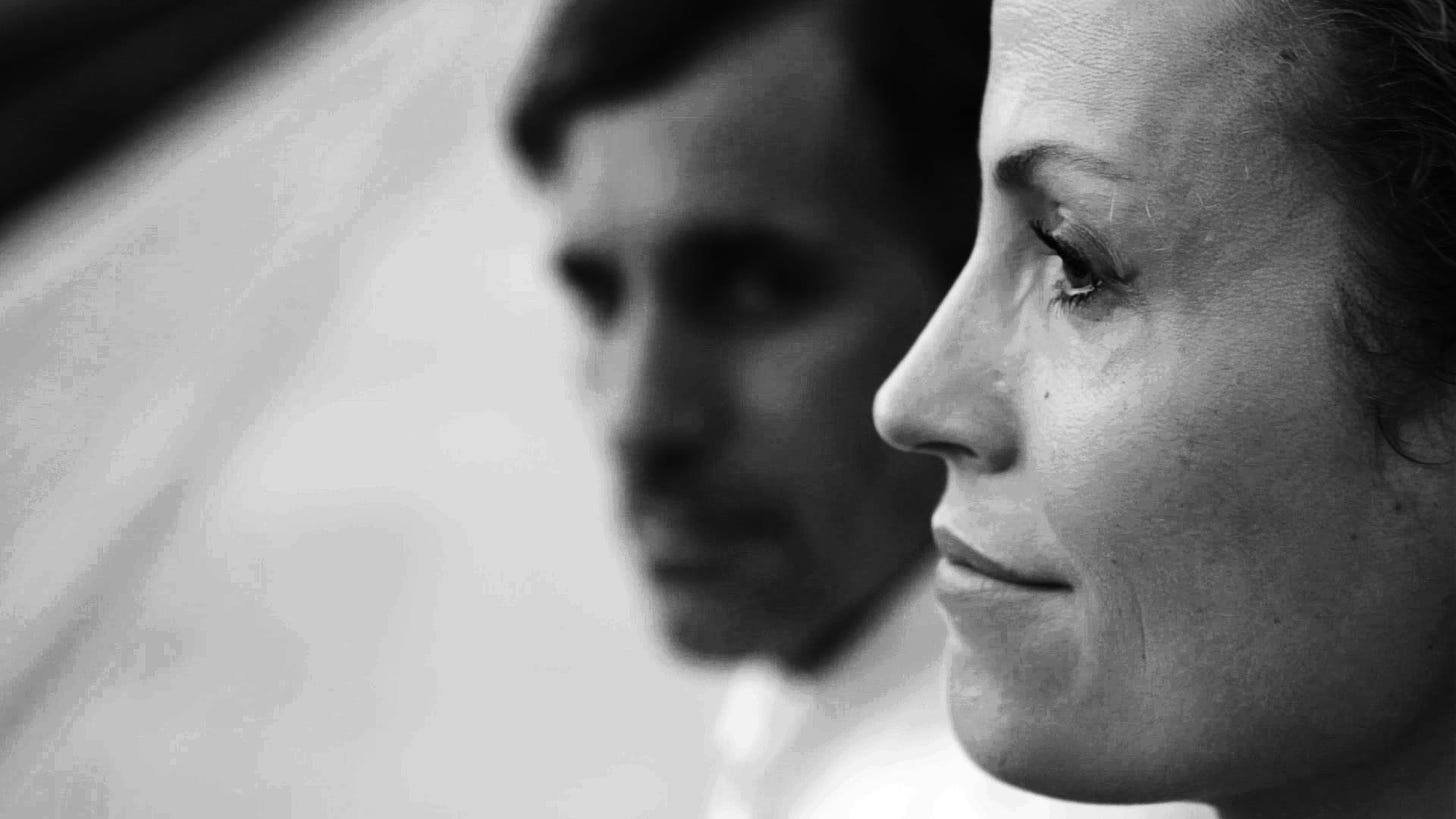
I’m late to the party. No surprise there. This is a 2013 film. Nine years later, here I am. After watching the film and reading several reviews, I’m a bit perplexed by allusions to Woody Allen. One article describes it as a “Woody Allen-esque comedy of errors and convoluted relationships.”1 But it’s not really a comedy. The jokes are funny to the characters only. It is a brilliant film in many ways, but it’s deep and very dark, and I can honestly say that there was no point at which I found it humorous. The acting is flawless. The cinematography is amazing. Visually, it is stunning. I also love the steady undercurrent of jazz. But Woody Allen? Sorry, I don’t see it. I watch Annie Hall and laugh at every line. But this? I watched King of Herrings with rapt attention, eager to catch every word, observe everything, but never once did I laugh. I love it, because it makes me contemplate the human condition, but it is not, at least for me, a moment for laughter.
“Black-and-white cinematography, abrasive language….smooth jazz, and professional camerawork preside over the angry, dissatisfied tone of hateful ramblings.”2 Such is how a review from 2014 characterizes King of Herrings, an indie film assembled by a pack of old boys from LSU’s MFA program.3 (Giants from my childhood, their names often on the lips of the adults around me, since my mother was in that MFA program, studying like they were under the late John Dennis, giant of giants. Only these old boys had a very special relationship with Dennis, who is like the guardian angel over this film, in a way.)4 Eddie Jemison co-directs it and also assumes the role of “Ditch.” He leads the plot along from the start, dropping C-bombs and instigating the conflict by refusing to settle an eight-dollar debt. Gat (David Jensen) rolls along with him; and while these two are lamenting undervalued masculinity, we see Augie (John Mese) opening up the diner. These are the two patrons of the diner, with nothing to do besides banter, and be served coffee and soup by Augie, who, unlike them, has a job. Ditch expresses his dream of driving off, the wind in his hair. Gat chides him with, “You don’t even have a car.” And that hurts. He doesn’t even have a car.


King of Herrings. Who’s that? Is it Ditch, because he can drop C-bombs like no other? Is it Augie, the US Navy vet, now quietly managing his diner and stoically enduring the drama stirred up by herrings who want to be sharks? Or is it Arthur, the so-called “professor” (Joe Chrest) because he manages to rule with the soft, slick touch of scholarly reason and logic? Arthur and Ditch are the obvious contenders, locked in a duel throughout the film, with Gat and Leon (Wayne Pére) serving as their respective seconds. Augie simply endures. He’s not there to fight and he has no stake in the game.
Ditch has no value or interest in his wife. Mary (Laura Lamson) barely tolerates her existence in their house, cooking the breakfast and brewing the coffee that he scorns. He doesn’t need Mary, and she does nothing for him anyway. He talks to Gat. He feeds himself at Augie’s diner. Mary walks around the house, popping pills that keep her in a perpetual state of numbness. She wants a baby. Her herring husband cannot provide that and he transforms his denied masculinity into scorn of everything but masculinity.
Evie (Andrea Frankle) is uninitiated. She and her pregnancy, I suppose, represent potential. She will hurry up and marry Carlo, hopefully before he or anyone can notice the cause for the imperative. Gat wants to have an affair; he, like Ditch, has no satisfaction in his marriage and he wants anything else. He’s a herring who wants freedom, in contrast to Evie who is desperate to get herself married, a lonely fish having perhaps more freedom than she likes, and therefore in search of safety. When Gat tries to talk Evie into running away with him, she gently rebuffs him by reminding him that she “has” to marry Carlo. Have to? Knowing what she means, he asks if the baby is his. Her imperative might be his escape route from his own dissatisfying existence. But she was already pregnant with Carlo’s baby when they had their affair. “I don’t have that kind of life in me anyway,” he says morosely. His masculinity is split—the man lusts after the woman he can’t have, or won’t dare to have, but the man also won’t betray the unspoken code of masculine ethics. (Apparently, the herring can cheat on the herring he’s with, but it’s a sin, he says, to cheat with another man’s herring. “Unforgivable,” sighs Gat. “This I live by.”)
Film reviewer Mike Massie gave the film high marks for acting, but docked points for storytelling, asserting that it lacked focus. I disagree. I think the story is remarkably woven together. (“It’s an ensemble picture, where the characters cannot connect,” wrote Sheila O’Malley.)5 Yet the characters are bound together in a way that serves a rich dynamic for the audience. (But, as Sheila says, they cannot break free. They are “trapped and little minded.”)6 The one fault I can find is that there seems to be no conclusion, nor evolution, but that might be intentional. It ends with everything in limbo. Only Mary seems to have walked away from the unsatisfying status quo. Ditch will go on, embittered. Gat will go on, hopelessly. “The professor” will find other clients. Augie will endure, old salty dog that he is. Evie will get married and go on, driven by imperative and fear, and lust. I had to wonder about Leon. “The Robot,” so-called because of his reliance on a electrolarynx—the device that gives him a voice in most of the film, but which is ultimately broken by the incurably irate Ditch. In the end, Leon loses his voice. Mary takes her voice back, but in so doing, loses her home. She’s a fish out of water.
To borrow the words of Jen Johans, Mary is a cross between “a tragic Tennessee Williams heroine and Nora from Henrik Ibsen’s A Doll's House, although the character played by Laura Lamson walks softly from the beginning, much like Herrings, she sneaks up on you by the final frame.”7
And Sheila puts it like this: “One of the great strengths of King of Herrings (in the script, the direction, and the performances) is that while it does not sentimentalize these characters, it doesn’t condemn them, either. It presents them, warts and all. They are guys with limited options in life. While that does not excuse their brutality, it does explain some of it. These are guys who see women as frighteningly ‘Other.’ Women are weak, and therefore to be held in contempt … and yet also … they have power over men, because men desire them … It’s a double-bind, and the two women in the film, Mary and ‘Evie’ (Ditch’s sister, played by Andrea Frankle) are both trapped. It’s a man’s world and they’re just living in it.”8

So while I agree with one of the comments on YouTube (“left me wondering how things ended up”) I think it’s not necessarily a bad thing that the ending is vague, or that the dysfunction goes unresolved. Life is vague and too often lacks resolution. There are, in short, worse things to say about a film than that it is too realistic! The black-and-white cinematography (at least two reviewers compared it to John Cassavetes)9 enhances the sense of vagueness too. With a jazzy underscore, we are transported to a New Orleans of another time that could also be any time. The place, though, that’s not vague. We see plainly enough that this is not the French Quarter. This is the New Orleans of Anita’s Grill, and the VA hospital, on Tulane Avenue, perpetually rundown in spite of the endless construction, and where the grass despondently struggles to grow between the cracks in the sidewalk. “[The film] has to do with a socio-economic class that no one else talks about,” said Jensen.10 In the same interview, for New Orleans Public Radio, in September 2013, as the actors looked forward to the screening at the New Orleans Film Festival, Chrest pointed out that the only thing these men [in the film] have is their “machismo. They don’t have the means to do anything, really, except have coffee and talk…and dream.”11 Dream of anything else, of freedom that is just out of reach, inaccessible without the kind of courage which they can’t or won’t manifest.
You can watch King of Herrings on YouTube (embedded below) or Amazon Prime. Both services (as well as Roku, Tubi, and Plex) offer it free with ads.
Directors: Eddie Jemison and Sean Richardson
Producers: Jemison, David Jensen, John Mese, and Sean William Meier
Writer: Eddie Jemison
Editor/Cinematography: Sean Richardson
Composer: Chris Walden
Sound: Larry Blake, Billy Theriot
225 Staff. “KING ME – CO-DIRECTOR SEAN RICHARDSON TALKS NEW COMEDY KING OF HERRINGS.” https://www.225batonrouge.com/.
Review of the film by Mike Massie: http://gonewiththetwins.com/new/king-of-herrings-2014
Interview with David Jensen & Joe Chrest: https://www.wwno.org/tags/king-of-herrings.
225 Staff. “THE RIOT REUNION – KING OF HERRINGS RECONNECTS LSU FRIENDS.” August 31, 2013. https://www.225batonrouge.com/.
Sheila. “King of Herrings (2013).” The Sheila Variations. November 2, 2013. http://www.sheilaomalley.com/?p=72028.
ibid.
Review of the film by Jen Johans, for Film Intuition, LLC: https://reviews.filmintuition.com/2015/04/movie-review-king-of-herrings-2013.html
Sheila. “King of Herrings (2013).” The Sheila Variations. November 2, 2013. http://www.sheilaomalley.com/?p=72028.
See note 2 & also, a Phoenix New Times review by Heather Hoch: http://www.phoenixnewtimes.com/arts/phoenix-film-festival-review-eddie-jemisons-king-of-herrings-6557556
Interview with David Jensen & Joe Chrest: https://www.wwno.org/tags/king-of-herrings.
ibid.






